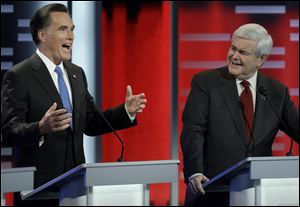
Gingrich in hot seat during Iowa debate
12/11/2011
Republican contender Mitt Romney makes a point as Newt Gingrich listens during the GOP debate in Des Moines, the 12th since the campaign began.
DES MOINES -- Newt Gingrich's Republican presidential rivals teed off on the former House speaker Saturday night in an Iowa debate, accusing the new GOP front-runner of being too tied to Washington and too full of odd ideas.
Former Massachusetts Gov. Mitt Romney was armed with a list of disagreements. "The real difference, I believe, is our backgrounds. I spent my life in the private sector. I understand how the economy works," he said.
Mr. Gingrich fired back. "Let's be candid. The only reason you didn't become a career politician is you lost to Teddy Kennedy in 1994," he said, when Mr. Romney lost a Senate bid.
Boos erupted.
"You'd have been a 17-year career politician by now if you'd won," Mr. Gingrich said.
Mr. Romney tried to turn that idea around. "If I would have been able to get into the NFL [National Football League] like I wanted to when I was a kid, I'd have been a football star. … Losing to Teddy Kennedy was probably the best thing I could have done for the job I'm seeking," he said. "It put me back in the private sector."
That got applause.
Throughout the two-hour debate at Drake University, televised nationally by ABC, six GOP candidates clashed over health care, child labor, the Social Security payroll tax, and other issues.
Mr. Gingrich is now the front-runner to win Iowa's Jan. 3 caucuses, according to recent polls.
A CNN/Time/ORC Iowa poll taken Nov. 29-Dec. 6 found Mr. Gingrich with 33 percent, Mr. Romney with 20 percent, and Texas Rep. Ron Paul with 17 percent.
Mr. Gingrich's surge also has made him the target of his rivals, and they all took him on.
Mr. Romney went after Mr. Gingrich for advocating a permanent lunar colony and over his recent statement that child labor laws are "truly stupid."
"Poor children in really poor neighborhoods have no habits of working and have nobody around them who works," and should consider janitorial work, among other things, Mr. Gingrich said. "Kids ought to be allowed to work part time. ..."
Mr. Romney said he disagreed with that approach.
Rep. Michelle Bachmann (R., Minn.) pressed hard against both Mr. Gingrich and Mr. Romney, calling their common issue positions "Newt-Romney" stands on health care, global warming, bank bailouts, and more.
Mr. Romney drew laughter in responding that while he liked Mr. Gingrich, "he and I are not clones."
Under questioning from Mr. Paul, Mr. Gingrich said he had never lobbied for Freddie Mac, a quasi-government agency that paid him at least $1.6 million to provide strategic advice.
"It's the taxpayers' money, though," Dr. Paul said. "We were bailing them out."
The tone was respectful, at least in the early moments of the debate, the stakes ever higher as six rivals met on a stage in the Iowa capital city. The debate was the 12th since the long campaign began and the first since Herman Cain suspended his candidacy after allegations of sexual harassment and an extra-marital affair.
The six contenders were split on legislation making its way toward a year-end vote in Congress to extend a Social Security payroll tax into 2012. Mr. Romney, Mr. Gingrich, and Mr. Paul said they favored it. Ms. Bachmann, Texas Gov. Rick Perry, and ex-Pennsylvania Sen. Rick Santorum were opposed.
For Mr. Gingrich, the debate brought new standing -- a center position onstage that comes with being a leader in the polls -- as well as the challenge of fielding criticism from his rivals.
Ms. Bachmann criticized Mr. Gingrich for first supporting a requirement for individuals to buy health insurance in 1993. As to Mr. Romney, she said he had pushed for a state health-care law as Massachusetts governor that contained an individual mandate.
Mr. Gingrich said the mandate he backed was a conservative alternative to President Bill Clinton's national health-care plan. "It's now clear the individual mandate is unconstitutional," he said.